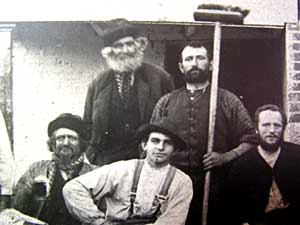| The Independents |
Beer maker stays independent
August 30, 2004
 |
| Some early workers at Schell's pose for a picture. The photo is part of the collection at the company's museum. (Photo courtesy of August Schell Brewing Co.) |
New Ulm, Minn. — The headquarters of Schell's, on the banks of the Cottonwood River, is loaded with history. It even has its own museum. So many things have happened that company president Ted Marti has to be careful to get his centuries right.
"This was actually an old truck garage that we, I think in '85 -- 1985 -- we converted into a museum," says Marti.
Walk inside the museum and you'll find a condensed history of the company. The end of delivery trucks is not the only change at Schell's. Old wood beer kegs line the floor. Schell's and other brewers use metal kegs now. Early pictures of brewery staff stare at old cone-top beer cans.
 | |||
A bass drum hangs from the ceiling, part of one thing that hasn't changed. The company still sponsors what's called Schell's Hobo Band. Marti digs out a tape of their music and plays a song called, "When the Sun Comes Over Schell's Brewery."
The oompah music by the Hobo Band says a lot about why Schell's is still around. Both sprang from the same German roots. New Ulm was settled by German immigrants in the 1850s, who brought with them a taste for beer. August Schell came to the U.S. in 1848. He lived first in Cincinnati, but eventually made his way to Minnesota.
Like most immigrants, his new life mixed grand adventure with a sense of things lost. One was German beer. In 1860, August Schell and a partner started the brewery in New Ulm. A century and a half later, German culture is still celebrated in New Ulm, and Schell's is still making beer.
It's a history filled with numbers. The company has been in business for 144 years, had seven presidents, produces 70,000 barrels of beer annually. It has 44 employees. And 29? That's the number of years Ted Marti has been working at his family's business. Marti is the great-great grandson of August Schell.
 | |||
"I came out of college, actually at my dad's request, to come back. This was in ... 1975, I believe. Business was getting a little tougher and my dad had decided that we needed to diversify," Marti recalls. "So he got some little article on hydroponic tomatoes, and decided that we ought to build some tomato gardens up on some empty land we had up on top of the hill. But he needed somebody to run that. I had a background in natural resources, so that was probably close enough."
The story points out a couple of reasons the family is still in business. It's always been willing to try new things. Marti says the tomato business only lasted four years, but was "moderately successful." Also, family members were always ready to do whatever job needed doing.
Ted Marti is president now, but he's not confined to an office. He always carries a pocket knife for minor fix-it jobs. At one time or another he's done nearly every type of work there is in the plant, including being the brewmaster. He can still do most jobs, and often helps out when the crew is shorthanded.
That sort of willingness to scramble has helped the company get through some tough times. When alcohol was banned in the U.S. during Prohibition, the company made soft drinks, near-beer and even candy.
 | |||
When Prohibition ended in 1933, the company's great years began. After World War II, beer sales in the U.S. rose dramatically. The boom changed the way beer is sold, but laid the groundwork for Schell's next crisis.
At that time, small brewers like Schell sold most of their beer within 100 miles of home. It was a throwback to the industry's early days, when kegs had to be returned to the brewer. That limited how far away the beer could be sold.
By the 1950s, the distance barrier became history. Thanks to things like throwaway containers, improved storage and better transportation, beer could be sold anywhere. National companies like Budweiser and Miller did just that, aggressively targeting local markets served by small brewers like Schell's.
"As the beer business got tougher and tougher (for) small, regional family breweries, their response was to sell it a little bit cheaper, a quarter cheaper or whatever," Marti says. "And every time the price would go up, you wouldn't raise quite as much as they did. And pretty soon there was this large gap in price."
 | |||
And in profits. But the "sell it cheaper" approach backfired, because consumers believed the price gap equaled a quality gap. Television ads told them the national brands tasted better, and many people paid extra for that belief.
By the 1960s, scores of small brewers were selling out. Marti says Schell's survived by finding new sources of business. It produced specialty beer cans promoting small town celebrations. It tried new ideas like the tomato experiment. At one point, the company sold some very valuable old-growth walnut trees on its property for cash.
Another thing that helped was that Schell's core constituency in New Ulm and nearby towns did not desert for a national brand. It was partly based in culture -- the Germans were loyal to hometown institutions. Marti says it was also payback for the company's civic contributions.
"We've got a park here that's open to the public. Anybody can come out and walk through," Marti says. "Chamber of Commerce -- we've all kind of done our duty on there, just be very active in the community. So those things always help keep the support strong here."
 | |||
Since the 1980s another factor has helped Schell's. Small brewers have come back. They're making old flavors new again by brewing types of beers the big labels have forgotten about. In the process, they've cut into the sales of the national brands.
Schell's is part of the trend, offering beers named Caramel Bock, Firebrick Lager and Snowstorm. The company is also making money on some famous regional beers. Two years ago it bought the Grain Belt label, nearly doubling its output.
In Schell's long history, the family has only once considered selling the business -- during Prohibition. Ted Marti researched company board minutes from that period, and found that the board had agreed to sell, but never finished the deal.
Marti says he couldn't find out exactly why the board balked, but he thinks it's because no family member has ever really wanted to sell. It's part of the same drive that saw Marti grow tomatoes, try new jobs, fill in at the plant -- do whatever was needed to keep the company going.
|
News Headlines
|
Related Subjects
|

